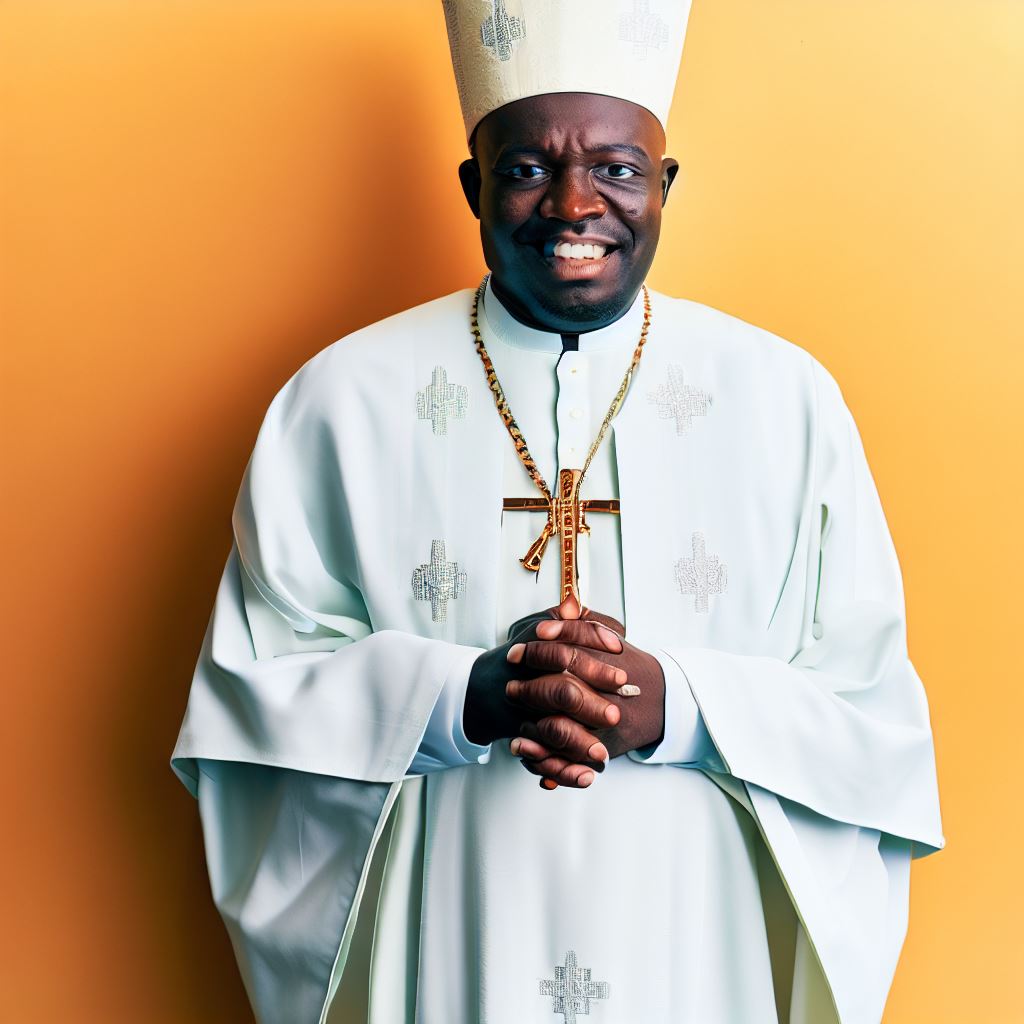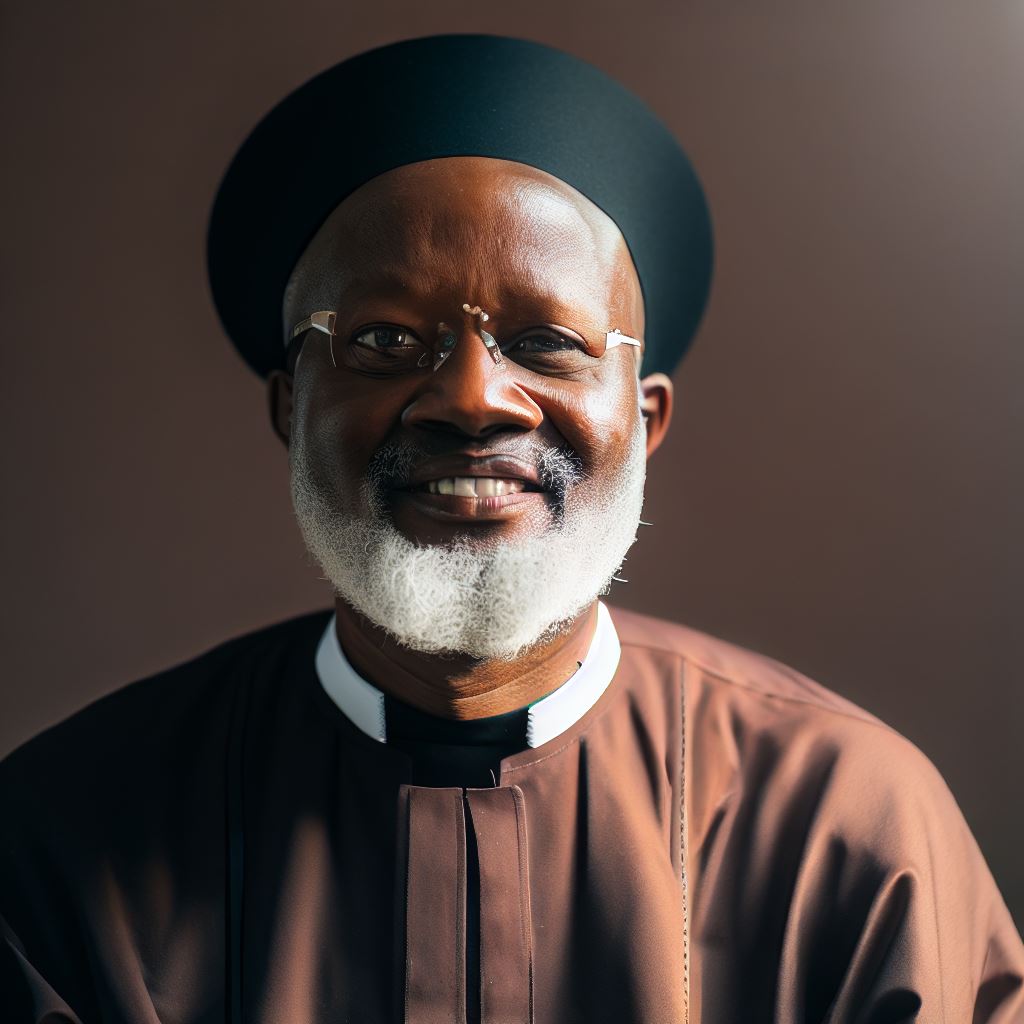Introduction
Joining the clergy in Nigeria is a process that holds great importance in Nigerian society.
The clergy plays a vital role in religious and spiritual guidance, influencing the beliefs and values of the population.
This step-by-step guide will provide valuable information on how to pursue a clergy career in Nigeria.
Understand the Role of the Clergy
The clergy in Nigeria play a crucial role in the religious and spiritual life of the people.
They are responsible for guiding and leading their congregation in matters of faith and providing moral and spiritual support.
A. Responsibilities and Duties of the Clergy in Nigeria
- Preaching and Teaching: One of the primary responsibilities of the clergy is to deliver sermons and teach the principles and teachings of their religion to the congregation.
- Conducting Religious Ceremonies: The clergy perform various religious ceremonies such as baptisms, weddings, funerals, and other sacraments important to their faith.
- Providing Pastoral Care: Clergy members offer counseling and support to individuals and families, helping them navigate through personal challenges, grief, and spiritual dilemmas.
- Community Outreach: The clergy are actively involved in community service and outreach programs, aiming to uplift and improve the lives of those in need.
- Leadership and Administration: They provide leadership within their respective religious organizations, overseeing the day-to-day operations and managing the affairs of the congregation.
B. Different Types of Clergy Positions
- Priests/Imams/Reverends: They are the spiritual leaders of a particular religious community and are responsible for leading worship, performing sacraments, and providing guidance to the faithful.
- Deacons: Deacons assist the clergy in various tasks, such as visiting the sick, organizing charitable activities, and supporting the clergy in their duties.
- Pastors: Pastors are primarily responsible for the overall well-being of their congregation, including counseling, preaching, leading worship services, and managing the church’s affairs.
- Bishops: Bishops hold a higher position of authority within their religious organization. They oversee a group of churches or dioceses and are responsible for ordaining clergy and maintaining the unity of faith.
- Evangelists/ Missionaries: These clergy members focus on spreading their religious beliefs to non-believers, often through preaching, teaching, and engaging in missionary work.
- Spiritual Directors: They provide personalized spiritual guidance to individuals seeking a deeper understanding of their faith and a stronger connection with God.
- Chaplains: Chaplains serve in specific institutions such as hospitals, armed forces, correctional facilities, or educational institutions, providing spiritual support to individuals in these settings.
- Elders: In some religious traditions, elders are respected clergy who hold wisdom and experience. They provide guidance and support to the clergy and the congregation.
Understanding the role, responsibilities, and different types of clergy positions available in Nigeria is crucial for those considering joining the clergy.
It allows individuals to make informed decisions and choose a path that aligns with their beliefs and passion for serving their religious community.
Read: Women in Nigeria’s Clergy: Roles and Responsibilities
Research Different Denominations
A. Overview of the major Christian denominations in Nigeria
Nigeria is a diverse country with various Christian denominations. Here is an overview of some of the major denominations in Nigeria:
- Roman Catholic Church: The largest Christian denomination in Nigeria, with a hierarchical structure led by a bishop. Emphasizes the authority of the Pope and follows traditional Catholic teachings and practices.
- Anglican Communion: One of the oldest denominations in Nigeria, associated with the Church of England. Known for its liturgical worship, bishops, and connection to the Archbishop of Canterbury.
- Pentecostal Churches: A diverse group of denominations that emphasize spiritual gifts and the Holy Spirit’s work. Known for vibrant worship, speaking in tongues, divine healing, and prosperity teachings.
- The Redeemed Christian Church of God (RCCG): One of the largest Pentecostal denominations in Nigeria, with a strong emphasis on prayer. Known for its intensive evangelism, large annual conferences, and commitment to social welfare.
- The Living Faith Church Worldwide (Winners’ Chapel): Founded by Bishop David Oyedepo, this charismatic denomination emphasizes prosperity and faith. Known for its large auditoriums, dynamic preaching, emphasis on tithing, and faith-based miracles.
- The Deeper Christian Life Ministry: This holiness denomination emphasizes sanctification, deep Bible study, and holy living. Known for its strict moral values, prayer conferences, and focus on personal holiness.
- The Methodist Church Nigeria: A Protestant denomination, influenced by the Methodist tradition brought by British missionaries. Emphasizes social justice, evangelism, and the importance of holiness.
- The Presbyterian Church of Nigeria: A Reformed denomination with Scottish roots, known for its governance by presbyteries. Emphasizes the sovereignty of God, scriptural teachings, and community involvement.
- The Evangelical Church Winning All (ECWA): A major Protestant denomination in northern Nigeria, with strong evangelical and missionary focus. Engages in education, healthcare, and community development projects alongside evangelism.
B. Characteristics and beliefs of each denomination
Each denomination in Nigeria has its own unique characteristics and beliefs, appealing to different individuals based on their spiritual preferences and cultural background.
It is essential to research and understand these denominations before considering joining any clergy in Nigeria.
By doing so, you can align yourself with a denomination that best fits your beliefs and values, enabling you to serve as an effective clergy member within that denomination.
Reflect on Personal Calling
Reflecting on one’s personal calling to the clergy is of utmost importance in the journey to become a clergy member in Nigeria.
Discerning this calling allows individuals to understand their purpose and passion for serving in the clergy and enables them to embark on a path that aligns with their spiritual convictions.
A. Importance of Discerning One’s Calling
Determining one’s calling is crucial as it serves as the foundation for a fulfilling and meaningful ministry.
Without a clear understanding of this calling, individuals may find themselves disillusioned or lacking the motivation to serve others effectively.
Discerning one’s calling also helps in identifying the specific area or type of ministry one is best suited for.
It narrows down the options and enables individuals to focus their efforts and energies in areas where they can make the greatest impact.
B. Guidance on Self-Reflection and Prayers
- Set aside dedicated time for self-reflection. Find a quiet and peaceful environment where you can engage in introspection.
- Ask yourself probing questions. Reflect on your upbringing, life experiences, and moments when you have felt closest to God.
- Think about the qualities and skills you possess that make you suitable for the clergy. Consider your ability to connect with people, empathize, and provide spiritual guidance.
- Pray for guidance and clarity. Seek wisdom from God and ask for His guidance in discerning your calling to the clergy.
- Engage in conversations with trusted mentors or spiritual leaders. Seek their guidance and insights as you navigate your path towards becoming clergy.
- Participate in spiritual exercises and retreats. These can provide a conducive environment for self-reflection and deepening your connection with God.
Remember, discerning one’s calling is a personal and spiritual journey. It may take time and patience to gain clarity. Embrace the process and trust in God’s timing.
By reflecting on your personal calling, you are taking an essential step towards joining the clergy in Nigeria. It shows your dedication and commitment to serving God and His people.
Continue to seek discernment through self-reflection, prayer, and guidance from trusted individuals, and you will find your path becoming clearer as you progress towards becoming a clergy member in Nigeria.
Stay tuned for the next steps in our comprehensive guide on “How to Join the Clergy in Nigeria: A Step-by-Step Guide.”
Read: Becoming a Bus Driver in Nigeria: Steps & Qualifications
Seek Guidance and Mentorship
Seeking guidance and mentorship from experienced clergy members is crucial in the journey towards joining the clergy.
Here are some key reasons why:
- Learn from experienced individuals: Seeking guidance from experienced clergy members allows aspiring clergymen to learn from their wisdom and expertise. These individuals have likely gone through the same process and can provide valuable insights.
- Receive spiritual guidance: Clergy members who have been in the field for a longer time can offer spiritual guidance to those just starting their journey.
They can provide advice on developing a strong spiritual foundation and navigating the challenges that come with being clergy. - Gain practical knowledge: The clergy role requires various practical skills, such as conducting religious ceremonies and counseling individuals. Seeking guidance from experienced clergymen can help aspiring clergy members gain practical knowledge in these areas.
- Network and build connections: Building connections within the clergy community is essential for career growth and support. Mentors can introduce aspiring clergymen to other clergy members, creating opportunities for collaboration and professional development.
- Receive emotional support: The journey towards joining the clergy can be emotionally challenging. Having a mentor who has been through similar experiences can provide emotional support and encouragement during difficult times.
- Accountability: Mentors can hold aspiring clergy members accountable for their progress and goals. They can provide guidance on setting and achieving milestones, ensuring that individuals stay on track in their journey.
- Guidance in ethical dilemmas: The clergy role often involves navigating complex ethical dilemmas. Experienced clergy members can offer advice and guidance on handling moral challenges, helping aspiring clergymen make ethical decisions.
Overall, seeking guidance and mentorship from experienced clergy members is invaluable for those aiming to join the clergy.
The benefits include gaining knowledge, support, and guidance in both practical and spiritual aspects of the role.
Enroll in Theological Education
A. Various theological institutions in Nigeria
To become a clergy member in Nigeria, it is crucial to enroll in a reputable theological institution.
These institutions not only provide the necessary education but also help shape individuals into competent religious leaders.
Here are some of the theological institutions in Nigeria:
- The Redeemed Christian Bible College: This institution offers theological programs to individuals who want to become pastors or priests. They have campuses in different states across Nigeria, providing easy access to aspiring clergy members.
- ECWA Theological Seminary: Located in Jos, this seminary focuses on training individuals who wish to serve as pastors or in other leadership roles within the Evangelical Church Winning All (ECWA).
- Baptist Theological Seminary: Situated in Ogbomosho, Oyo State, this seminary provides comprehensive theological education to candidates interested in Baptist ministry.
- Catholic Institute of West Africa (CIWA): Aspiring Catholic clergy members can pursue their theological studies at CIWA in Port Harcourt, Rivers State. This institute focuses on equipping individuals with the knowledge and skills required for effective ministry.
- Seminary of All Saints: This seminary, located in Ekpoma, Edo State, is affiliated with the Anglican Church and offers programs for those interested in ministry within the Anglican tradition.
B. Admission process and requirements for theological studies
Now that you are aware of some of the theological institutions, let’s discuss the admission process and requirements for theological studies:
- Research: Begin by researching the various theological institutions’ admission requirements, curriculum, and reputation to find the one that aligns with your beliefs and goals.
- Application: Complete the application form provided by your chosen institution. These forms usually require personal information, academic background, and a statement of purpose.
- Academic Qualifications: Most institutions require a minimum of a high school diploma or its equivalent for admission into their programs. Some institutions may have additional entry requirements, such as specific grades or subject prerequisites.
- Entrance Exams: Many theological institutions require applicants to take entrance exams to assess their aptitude for theological education. These exams usually cover areas like biblical knowledge, theology, and general knowledge.
- Interviews: Shortlisted candidates may be invited for an interview, where they will be assessed on their suitability for the program and their commitment to religious service.
- Recommendation Letters: Institutions often request recommendation letters from individuals who can attest to the applicant’s character, academic abilities, and potential for ministry. These letters should come from respected figures within the religious community or academic sphere.
- Application Fee: Most institutions require applicants to pay a non-refundable application fee. The amount varies, so make sure to check with the institution for the specific fee and payment process.
- Deadlines: Pay close attention to the application deadlines set by the institutions. Missing the deadline may result in your application being deferred to the next academic session.
Read: A Day in the Life of a Nigerian Priest: A True Account

Complete Theological Education
To join the clergy in Nigeria, completing a theological education is an essential step. This education equips individuals with the necessary knowledge, skills, and spiritual foundation to serve as religious leaders.
Here, we will detail the duration and structure of theological programs in Nigeria, as well as discuss the coursework and practical experiences involved.
Completing a theological education is not only about acquiring knowledge but also about developing a spiritual foundation and personal transformation.
It is a journey that enables individuals to deepen their faith, understand the complexities of religious leadership, and serve their communities effectively.
A. Duration of Theological Programs
- Bachelor of Theology (B.Th.): Typically takes four years to complete.
- Master of Divinity (M.Div.): Usually requires three years of study.
- Doctor of Ministry (D.Min.): Can be completed in three to five years.
Structure of Theological Programs
- Bachelor of Theology (B.Th.): Undergraduate program focusing on biblical studies, church history, theology, and pastoral ministry.
- Master of Divinity (M.Div.): Graduate program providing advanced theological training and practical skills for ministry.
- Doctor of Ministry (D.Min.): Terminal degree program designed for experienced clergy seeking further specialization and leadership roles.
B. Coursework in Theological Education
- Biblical Studies: Courses exploring the Old and New Testaments, hermeneutics, and biblical languages.
- Church History: Studies on the history, development, and traditions of Christianity.
- Theology: Examination of key theological doctrines, ethics, and contemporary issues.
- Pastoral Ministry: Classes on preaching, counseling, leadership, and pastoral care.
- Missions and Evangelism: Training in spreading the Gospel, cross-cultural understanding, and engagement.
- Practical Theology: Hands-on experience in pastoral settings, such as internships or field placements.
Practical Experiences in Theological Education
- Field Education: Students are placed in churches or ministries to gain practical skills and apply their knowledge.
- Pastoral Internship: Provides an opportunity to shadow and learn from experienced clergy members.
- Preaching Practicum: Offers students the chance to develop their preaching skills through supervised practice.
- Counseling Practicum: Enables students to interact with individuals, couples, or families in a counseling setting.
- Mission Trips: Many programs offer opportunities to engage in missionary work locally or internationally.
By completing a bachelor’s, master’s, or doctorate in theology, aspiring members of the clergy in Nigeria can gain in-depth understanding of the Scriptures, church history, and theology.
They also learn practical skills like preaching, counseling, and leadership that are crucial for guiding and ministering to others.
Furthermore, the practical experiences provided in theological programs allow students to put their knowledge into practice.
Whether through field education, pastoral internships, or mission trips, students have the chance to serve and connect with different communities, cultures, and members of their congregations.
In review, theological education in Nigeria involves completing programs that range from bachelor’s degrees to doctoral degrees.
These programs offer a comprehensive curriculum that covers biblical studies, church history, theology, and practical ministry skills.
By engaging in this educational journey, individuals prepare themselves to become competent, compassionate, and effective clergy members who can positively impact their congregations and society as a whole.
Read: Social Media Tips for Promoting Beauty Therapy in Nigeria
Apply for Ordination
In order to become ordained in Nigeria, individuals must go through a rigorous process and meet certain requirements and assessments.
A. The ordination process in Nigeria
Here is a breakdown of the ordination application process:
1. Research and Choose a Denomination
Before applying for ordination, it is important to research and choose a denomination or religious organization to join.
Each denomination may have different requirements and procedures for ordination.
2. Find a Sponsor
Most denominations in Nigeria require applicants to have a sponsor who will vouch for their character and suitability for the clergy.
This sponsor is usually a member of the clergy or a senior member of the religious organization.
3. Complete the Application Form
Once you have chosen a denomination and found a sponsor, the next step is to complete the ordination application form.
This form typically includes personal information, educational background, and references.
4. Provide Supporting Documents
Along with the application form, you will need to submit supporting documents such as copies of your academic certificates, identification documents, and any other relevant certifications or qualifications.
5. Write a Personal Statement
Many ordination applications require a personal statement where you can explain your reasons for seeking ordination, your religious journey, and your commitment to serving the community as a member of the clergy.
6. Attend an Interview
After submitting the application form and supporting documents, you may be called for an interview with the denominational authorities.
During the interview, they will assess your suitability for ordination based on your beliefs, dedication, and understanding of the religious teachings.
7. Discernment and Assessment
Some denominations may require applicants to undergo a period of discernment and assessment.
This can involve attending training programs, workshops, or retreats to further explore your calling and enhance your knowledge and skills in theology and pastoral care.
8. Background Check and References
As part of the ordination process, authorities may conduct a background check to ensure that applicants have a good moral character and are free from any criminal records or behavior that could bring disrepute to the religious organization.
9. Approval and Confirmation
Once all the requirements and assessments have been completed, the denominational authorities will review your application and make a decision regarding your ordination.
If approved, you will be notified and your ordination ceremony will be scheduled.
10. Ordination Ceremony
The final step in the process is the ordination ceremony, where you will be officially recognized and consecrated as a member of the clergy.
This ceremony is usually performed by senior members of the religious organization and may involve rituals, prayers, and the laying on of hands.
Becoming ordained in Nigeria is a significant commitment and requires dedication, a sincere belief in the religious teachings, and a willingness to serve the community.
It is important to carefully follow the application process and meet all the requirements set by the denomination.
By successfully completing the ordination process, you will be equipped with the necessary skills and authority to fulfil your calling as a member of the clergy in Nigeria.
Learn More: Financial Aspects: Understanding a Pastor’s Salary in Nigeria
Explore Further: Challenges Faced by Nigeria’s Clergy: An Insightful Look
Participate in Ministry Internships
Obtaining practical experience through internships is crucial for anyone aspiring to join the clergy in Nigeria.
Internships provide valuable hands-on training and exposure to different aspects of ministry work.
Here’s what you need to know about ministry internships and how to apply for them:
A. Importance of Gaining Practical Experience
- Internships offer the opportunity to apply theoretical knowledge in real-life ministry settings.
- They allow individuals to learn from experienced clergy members, gaining insights and mentorship.
- Practical experience enhances your skills, boosts confidence, and prepares you for future responsibilities.
B. Information on Available Ministry Internships
- Research and identify churches, denominations, or religious organizations that offer internship programs.
- Consider the specific area of ministry you wish to focus on, such as youth, evangelism, counseling, or worship.
- Look for internships that align with your interests, values, and future ministry goals.
- Explore both local and national opportunities to broaden your horizons and experiences.
C. How to Apply for Ministry Internships
- Prepare a professional resume or CV that highlights your educational background and any relevant experience.
- Write a compelling cover letter expressing your interest in the internship and explaining why you are a suitable candidate.
- Consult with your mentors or spiritual leaders for recommendations and guidance during the application process.
- Follow the specific application instructions provided by each internship program or organization.
- Be mindful of application deadlines and submit all required documents on time.
- If possible, attend career fairs or networking events where you might find information on available internships.
- Show enthusiasm and dedication during interviews, emphasizing your commitment to learning and servant leadership.
- After completion of an internship, ask for recommendations or reference letters to enhance your future applications.
D. Maximizing Your Internship Experience
- Approach your internship with a positive attitude, eagerness to learn, and willingness to take on responsibilities.
- Ask questions, seek feedback, and actively participate in all aspects of ministry work.
- Build relationships with fellow interns, supervisors, and members of the congregation.
- Take advantage of any training or development opportunities offered during the internship.
- Reflect on your experiences, challenges, and personal growth throughout the internship.
- Keep a journal or log to document your learnings, insights, and significant moments.
- Engage in self-reflection and identify areas for improvement to further enhance your ministry skills.
- Discuss your internship experience with mentors or spiritual leaders to gain new perspectives and guidance.
Participating in ministry internships is a valuable stepping stone towards joining the clergy in Nigeria.
It provides firsthand experience, equips you with practical skills, and enriches your spiritual journey.
Don’t underestimate the importance of internships, as they can significantly contribute to your overall growth and preparedness for a fulfilling ministry career.
Continuously Develop Spiritually and Professionally
In order to become an effective clergy member in Nigeria, it is essential to focus on both spiritual and professional development.
Continuous growth in these areas will not only enhance your skills but also contribute to your overall effectiveness as a clergy member.
A. Ongoing spiritual growth and personal development
- Make time for daily prayer and reflection to strengthen your spiritual connection.
- Read religious texts and literature to gain a deeper understanding of your faith.
- Attend religious conferences, seminars, and retreats to expand your knowledge and network with fellow clergy members.
- Engage in spiritual practices such as meditation, fasting, and community service to deepen your spiritual experience.
- Seek guidance from experienced clergy members or mentors who can offer valuable insights and support.
B. The importance of continuous education and professional training
- Stay updated with the latest developments and trends in theology, religion, and pastoral care.
- Participate in workshops and training programs that focus on enhancing your pastoral skills.
- Join professional organizations and attend their conferences and events to network with other clergy members and gain new perspectives.
- Take advantage of online resources and courses to further your education and hone your skills.
- Pursue higher education in theology or a related field to deepen your knowledge and credibility.
Continuously developing spiritually and professionally not only enhances your effectiveness as a clergy member but also provides you with the tools to address the evolving needs of your congregation.
By investing in your own growth and development, you also serve as a role model for others, inspiring them to pursue their own spiritual and professional journeys.
Remember that becoming a member of the clergy is a lifelong commitment, and continuous development is an ongoing process.
Embrace the opportunity to learn, grow, and serve your community to the best of your abilities.
Conclusion
Joining the clergy in Nigeria requires several key steps.
First, obtain a theological education and relevant qualifications.
Next, seek guidance from a religious mentor or spiritual leader.
Then, undergo a discernment process to determine your calling. Apply to a seminary or religious institution for formal training and ordination.
Finally, engage in ongoing spiritual growth and development throughout your clergy career.
Aspiring clergy should approach this path with passion and dedication. It is a calling that requires a deep commitment to serving others and spreading the teachings of their faith.
Despite the challenges that may arise, pursuing a life in the clergy can be immensely rewarding and fulfilling.
Publish Your Professional Profile, Business or Brand
Showcase your expertise, gain trust, and boost visibility instantly on Professions.ng.
Publish NowBy following the necessary steps and embracing their calling, individuals can make a positive impact on their communities and the lives of others.
It is important to remember that joining the clergy is not just a career choice, but a lifelong commitment to one’s faith and the spiritual well-being of others.
It requires a genuine desire to serve and a willingness to continuously grow and learn.
The clergy hold a unique position of influence and have the opportunity to guide and support others on their spiritual journeys.
For those who feel a calling to the clergy in Nigeria, it is important to embrace the steps outlined in this guide and seek the necessary training and guidance.
By doing so, they can fulfill their true purpose and contribute to the spiritual development of their communities. It is a journey that requires dedication, but the rewards are immeasurable.
Let your passion and dedication guide you as you embark on this noble path.




